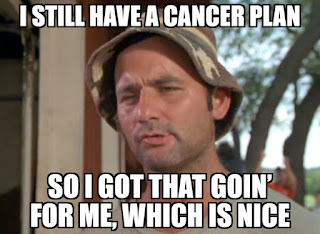When I speak to groups about their insurance, I often mention "Holy Trinity" of insurance, which is their medical
insurance, life insurance and disability insurance. The last one, disability insurance, I tell them, is just is important as the other two, because if one were to get sick or hurt and couldn’t work, the bills don’t stop
coming and will need to be paid. Disability is basically paycheck insurance.
But what if
you are, like me, self-employed, a 1099 employee or a business owner and don't have access to a group plan? What
would happen to your business if you were unable to work?
Which is why I like to bring up Business Overhead Expense (BOE) coverage. It’s an insurance product most people probably haven’t heard of before even though it's been around for a long time. And it
definitely one of the most undersold policies out there, probably because there
are agents who don’t even know about it.
Business
overhead expense insurance is designed to keep things going when a disability
or illness requires you to be temporarily absent. This is different from
personal disability insurance, which makes payments directly to you to replace
lost income if you can’t work.
If you own a
business, it’s important that you understand how BOE works so you can decide if
it’s something you need.
BOE is a type of insurance that pays benefits to
your business if you’re unable to work. For example, if you’re in a car
accident and are seriously injured, or you’re diagnosed with a serious illness,
your policy’s benefits could kick in to provide the business with cash flow
while you recover.
This type of
insurance is typically used to help manage your business’s day-to-day expenses.
It helps your business continue as usual even when you can’t be there.
What BOE Insurance Covers
BOE is business-specific, meaning it applies to expenses related
directly to running your business. The types of expenses you can use business
overhead expense insurance to pay include:
- Rent or
lease payments
- Loan
payments
- Insurance
premiums
- Utility
bills
- Custodial
services
- Payroll for
employees
- Tax
obligations
- Business
credit card bills
There are,
however, some things that overhead expense insurance is not designed to cover.
For instance, these policies don’t extend to expenses related to improving or
expanding your business, such as buying new equipment or opening a second
location.
Overhead
expense insurance also doesn’t cover your salary. That’s why you would need an
individual policy on yourself.
It’s worth
considering purchasing this type of insurance if you’re the person who’s primarily
in charge of running your business. Having an overhead expense insurance policy
in place means the bills continue to get paid for the business when a
disability or illness puts you on the sidelines.
Depending on
the terms of your policy, your insurance company could pay benefits for up to
two years after you file an eligible claim. That can be helpful if you have a
serious disability, illness or injury that requires extensive rehabilitation or
physical therapy.
Keep in mind
that not every business owner may qualify for this type of insurance. If you’re
self-employed as a freelancer and run a business from home, for example, you
may not be able to purchase a policy. You may have to stick with a regular
personal disability insurance policy instead.
There are
advantages associated with having this kind of insurance for your business.
Here are
some of the key benefits of BOE insurance:
- Your
business can remain open even when you can’t be there to run it
- Essential
business expenses can be paid for using policy benefits, allowing you to
preserve your business’s cash reserves
- Being able
to meet payroll means you have a better chance of retaining key employees
- A BOE policy
decreases the odds of having to dip into personal savings to cover business
spending
- Premiums
paid for coverage may be tax-deductible
- Business
expenses paid with premiums may also be tax-deductible
In terms of the downsides, here are a
few things to keep in mind:
- Policies
don’t pay benefits to you directly so you’ll still need separate disability
coverage for that
- Benefits
typically have a time limit of 2 years and can’t be paid indefinitely
- Any benefits
you receive may be considered taxable income for the business
- Policies may
enforce a maximum monthly benefit limit, which may be less than what you need
to continue operations
As you can
see, the pros generally outweigh the cons but they still need to be factored
in. And you also have to consider the potential return on investment for
purchasing this kind of coverage. Having it can be a safety net if you get sick
or become disabled but if you never end up using your coverage, you may feel as
if you’ve paid premiums for nothing.
The key advantage to having a BOE is that it
gives you time to make a decision if you are disabled. You probably won’t know
when or if you’ll
recover, or if you should shut down the business, sell it or keep it open. That
2 year benefit window gives you time to figure it all out.
If this is something
you think you need, drop by our website and make an appointment to have an
agent call you. Or you can leave a question on our contact form.
Chris Castanes is the president of Surf Financial Brokers, helping people find affordable life and disability insurance coverage. He's also is a professional speaker helping sales people be more productive and efficient and has spoken to professional and civic organizations throughout the Southeast. And please subscribe to this blog! Thanks!











